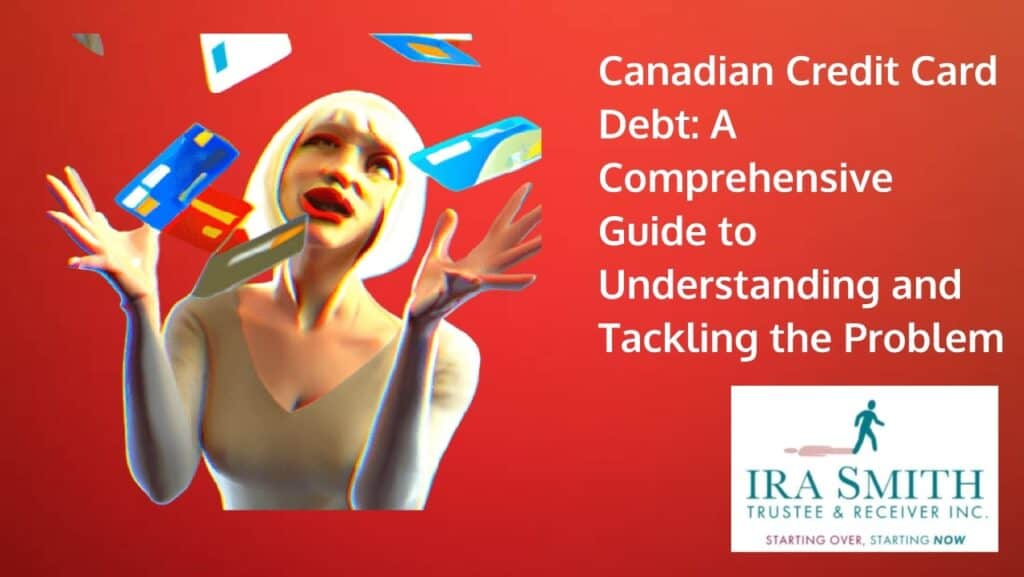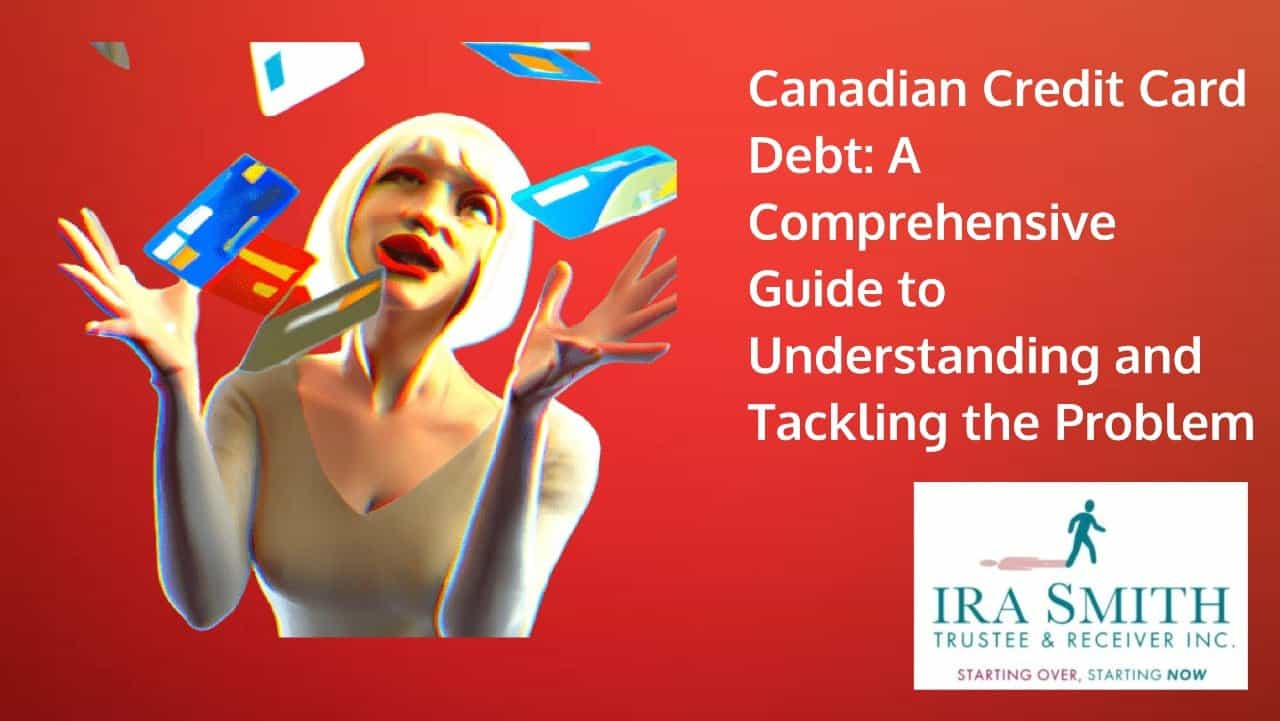- Canadian credit card debt: Introduction
- Canadian credit card debt: What is it and why could it be a problem?
- The current state of Canadian credit card debt
- Canadian credit card debt: Why do Canadians have so much credit card debt?
- Canadian credit card debt: Common mistakes people make when it comes to credit card debt in Canada
- Canadian credit card debt: How to tackle credit card debt in Canada
- Canadian credit card debt: Conclusion
Canadian credit card debt: Introduction
Due to the holiday buying season, December has traditionally been connected with a surge in Canadian credit card debt. Nonetheless, with the start of the COVID-19 pandemic in 2020 and the surge in case numbers, celebrations, travelling, and in-store holiday shopping pretty well stopped, resulting in an extraordinary reduction in Canadian credit card debt.
Thank you for reading our Brandon's Blog. Check out our AI insolvency bot on this page and don't forget to subscribe!
Fast forward 2 years to December 2022, and Canadian consumers have returned to their traditional pre-pandemic period of extravagance in holiday purchasing. With the pandemic’s hold loosening, Canadians have eagerly ushered in the holiday spirit, leading to a rebirth of the fad of maxing out credit cards. As a result of that, and other factors I will discuss below, Canadian credit card debt is once again growing.
The escalating issue of credit card debt in Canada is gradually becoming a matter of concern for individuals and the nation’s economy in general. In this Brandon’s Blog, I will delve deeper into the Canadian credit card debt predicament, the reasons behind its growth, and plausible solutions to tackle it.
Canadian credit card debt: What is it and why could it be a problem?
The outstanding balance of credit cards of Canadians at any specific point in time is what is described as Canadian credit card debt. It is built up when people utilize their credit card to make purchases, and afterwards, carry a credit card balance from one month to the next, rather than paying off the balance in full when due.
As this financial debt begins to grow, it can trigger a lot of stress and anxiety and make it hard to stay up to date with monthly expenses. Credit cards are well-known for having high-interest rates, which means that the longer a balance is carried, the more interest the borrower will be paying, making it even more difficult to pay down the amount owed.
Furthermore, excessive credit card debt can significantly harm a person’s credit rating, which can make it harder for them to get new loans or credit in the future. This can bring about missed payments or even default, both of which will, even more, harm their credit score.
If you don’t handle your Canadian credit card debt properly, it can lead to some serious financial problems.Canaa
The current state of Canadian credit card debt
According to recent reports by Statistics Canada and Equifax Canada, people’s credit card balances are on the rise. And it’s not just a one-time thing either – Equifax Canada’s report and the government statistical agency report both states that it has been going on for the past year. Actually, by the end of 2022, Canadian credit card debt had risen by 13.8% contrasted to the previous year, leading to an overall outstanding debt of $93.4 billion.
What’s specifically concerning is that this rise in credit card debt is striking lower-income households the hardest. With high inflation, lots of people in this group are turning to high-interest credit cards to cover important rising costs like food prices, medication, as well as rent. It’s clear that we need to do even more to sustain these Canadians and also help them resolve this problem of inflation causing extra costs for Canadians.
Credit card debt can be worrisome in Canada for a few reasons. One of them is that credit card companies tend to charge pretty high-interest rates here – around 20% or more! That’s quite a bit more than other kinds of debt you might have, like a car loan or a mortgage.
Another thing to keep in mind is that Canadians’ savings are low, due to many of the same reasons that Canadian credit card debt is rising – the main one being inflation. So if something unexpected happens, like a drop in income or an unexpected expense, some folks might not have much in the way of savings to fall back on.
All in all, it’s important to keep an eye on your credit card debt in Canada – it can pile up pretty quickly!
Canadian credit card debt: Why do Canadians have so much credit card debt?
Numerous factors contribute to the excessive credit card balances among Canadians. Among the primary reasons is the effortless accessibility of credit cards. Credit card companies aggressively market their products to Canadians, luring them with attractive incentives like sign-up bonuses, cashback rewards, and low introductory interest rates.
Canada’s high cost of living is another significant reason for the country’s high credit card debt. Canadians encounter steep housing costs, surging food and gas prices, and escalating expenses of every type and description. With income failing to keep up with expenses, many resort to credit cards to bridge the gap, leading to elevated debt.
When faced with unexpected expenses like vehicle repairs or other emergencies, many Canadians lack the necessary savings and turn to credit cards to bear the costs, further increasing their reliance on credit.
Finally, a considerable number of Canadians lack the financial literacy to fully understand the trap they are falling into by continuing their credit card usage with no hope of ever repaying the balance owed.
Canadian credit card debt: Common mistakes people make when it comes to credit card debt in Canada
Signing up for too many credit cards: This can make it challenging to stay on top of monthly payments and may even lead to overspending.
Neglecting to regularly review credit card statements: This can result in harmful errors or unchecked fraudulent charges, which can add up and cause undue stress.
Making large purchases: Using credit cards for a major expensive purchase without having a clear plan to pay off the balance, can lead to hefty interest charges and long-term debt.
Applying for too many credit cards: Often enticed by sign-up bonuses or rewards, too many credit cards can lead to an inability to monitor payment schedules and overspending.
Failure to regularly review credit card statements: This can result in undetected errors or fraudulent charges. This may ultimately result in an increased balance owed or avoidable fees.
Financing large purchases: Buying major expensive items such as automobiles or vacations using a credit card without a clear plan for repayment can lead to high-interest charges and long-term debt.
It’s essential to be mindful of these pitfalls and take steps to avoid them to stay financially healthy.
Canadian credit card debt: How to tackle credit card debt in Canada
The following are 7 practical tips and strategies that Canadian individuals grappling with credit card debt can utilize:
- Establish a budget: The primary step towards addressing Canadian credit card debt is establishing a budget. This will let you understand your revenue and expenses while identifying areas where you can decrease expenses to free up finances for debt repayment. It’s essential to factor in all bills, taxes, expenditures, and debt payments while drafting your budget.
- Prioritize debt repayment: After developing a budget, prioritize debt repayment. Begin by repaying high-interest debt, such as credit card debt, and make minimum payments on other debts.
- Consolidate debts: Consider consolidating credit card debt into a single loan that charges a lower interest rate. This simplifies debt management and lowers the interest paid over time.
- Seek expert assistance: If faced with challenges managing your debt, consider seeking expert assistance. This could involve partnering with a community non-profit credit counselling agency or a licensed insolvency trustee.
- Reducing expenses: Scrutinize your expenditure and identify areas where you can cut back, such as dining out, grocery shopping, and utility bills. Every penny saved can contribute towards debt repayment.
- Increase your income: This could include freelancing, part-time work, or selling unused items. These avenues could provide the additional funds necessary to accelerate your debt repayment.
- Avoiding unnecessary expenses: Using cash or debit cards as the form of payment instead of credit cards makes you think twice about every purchase before you make it.
Learning and using sound financial habits is fundamental for avoiding future credit card debt. Here are several compelling reasons why:
It creates superior financial management skills: The adoption of good financial habits, such as meticulous budgeting, diligent tracking of expenses, and prudent saving for unexpected contingencies, equips one with enhanced financial management skills. When one is always aware of their financial standing, they are less prone to impulsive expenditures, and the possibility of succumbing to credit card debt is thereby minimized.
It engenders a robust credit history: Good financial habits, such as paying your bills by their due date in full are what establish a good credit score. This augments the likelihood of future credit approvals and can result in more favourable interest rates and terms.
It eliminates tension and apprehension: Debt can be a source of profound stress, causing anxiety and other psychological distress. The development of good financial habits, together with the avoidance of credit card debt, can eliminate such concerns,
Canadian credit card debt: Conclusion
To conclude, by implementing these measures, you can take charge of your credit card debt and gradually work towards becoming debt-free.
I hope you enjoyed this Canadian credit card debt Brandon’s Blog. Revenue and cash flow shortages are critical issues facing people, entrepreneurs and their companies and businesses. Are you now worried about just how you or your business are going to survive? Are you worried about what your fiduciary obligations are and not sure if the decisions you are about to make are the correct ones to avoid personal liability? Those concerns are obviously on your mind. Coming out of the pandemic, we are also now worried about the economic effects of inflation and a potential recession.
The Ira Smith Team understands these concerns. More significantly, we know the requirements of the business owner or the individual that has way too much financial debt. You are trying to manage these difficult financial problems and you are understandably anxious.
It is not your fault you can’t fix this problem on your own. The pandemic has thrown everyone a curveball. We have not been trained to deal with this. You have only been taught the old ways. The old ways do not work anymore. The Ira Smith Team makes use of new contemporary ways to get you out of your debt problems while avoiding bankruptcy. We can get you debt relief now.
We have helped many entrepreneurs and their insolvent companies who thought that consulting with a trustee and receiver meant their company would go bankrupt. On the contrary. We helped turn their companies around through financial restructuring.
We look at your whole circumstance and design a strategy that is as distinct as you are. We take the load off of your shoulders as part of the debt settlement strategy we will draft just for you.
The Ira Smith Trustee & Receiver Inc. team understands that people facing money problems require a lifeline. That is why we can establish a restructuring procedure for you and end the discomfort you feel.
Call us now for a no-cost consultation. We will listen to the unique issues facing you and provide you with practical and actionable ideas you can implement right away to end the pain points in your life, Starting Over, Starting Now.

